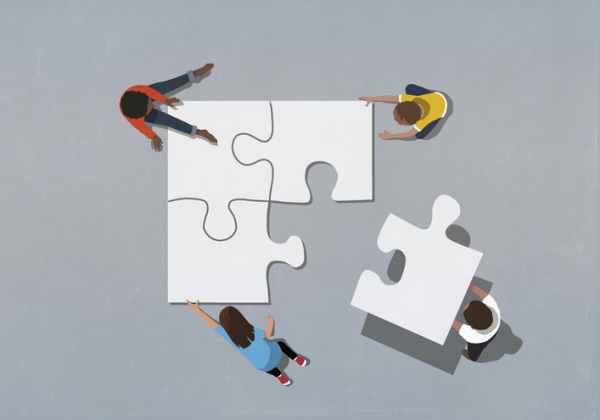
Gratitude enhances health, brings happiness — and may even lengthen lives

Several evenings a week, as Tyler VanderWeele gathers around the dinner table with his wife and two young kids, the family deliberately pauses during the meal to do something simple but profound. Each member shares several things for which they’re grateful — an act that VanderWeele, co-director of the Initiative on Health, Spirituality, and Religion at the Harvard T.H. Chan School of Public Health, feels changes his family dynamic for the better.
“I do think it makes a difference and can be a very powerful practice,” he says. “Even on those bad days where life seems difficult, that effort is worthwhile.”
Gratitude, health, and longevity
How can the power of gratitude affect our lives? Recent research has pointed to gratitude’s myriad positive health effects, including greater emotional and social well-being, better sleep quality, lower depression risks, and favorable markers of cardiovascular health. Now, new data from the long-term Nurses’ Health Study shows that it may extend lives.
“Gratitude has been one of the most widely studied activities contributing to well-being, but we couldn’t find a single prior study that looked at its effects on mortality and longevity, much to our surprise,” says VanderWeele, co-author of the new research.
What did the study look at?
Published July 2024 in JAMA Psychiatry, the new study drew on data from 49,275 women enrolled in the Nurses’ Health Study. Their average age was 79. In 2016, participants completed a six-item gratitude questionnaire in which they ranked their agreement with statements such as, “I have so much in life to be thankful for,” and “If I had to list everything I felt grateful for, it would be a very long list.”
Four years later, researchers combed through participants’ medical records to determine who had died. There were 4,608 deaths from all causes, as well as from specific causes such as cardiovascular disease, cancer, respiratory diseases, neurodegenerative disease, infection, and injury. Deaths from cardiovascular disease — a top killer of women and men in the United States — were the most common cause.
What did the researchers find?
Participants with gratitude scores in the highest third at the study’s start had a 9% lower risk of dying over the following four years than participants who scored in the bottom third. This did not change after controlling for physical health, economic circumstances, and other aspects of mental health and well-being. Gratitude seemed to help protect participants from every cause of death studied — including cardiovascular disease.
But what does this actually mean?
“A 9% reduction in mortality risk is meaningful, but not huge,” VanderWeele says. “But what’s remarkable about gratitude is that just about anyone can practice it. Anyone can recognize what’s around them and express thanks to others for what’s good in their life.”
While the study couldn’t pinpoint why gratitude is associated with longer life, VanderWeele believes several factors may contribute.
“We know that gratitude makes people feel happier. That in itself has a small effect on mortality risk,” he says. “Practicing gratitude may also make someone a bit more motivated to take care of their health. Maybe they’re more likely to show up for medical appointments or exercise. It may also help with relationships and social support, which we know contribute to health.”
What are the study’s limitations and strengths?
The study was observational. This means it can’t prove that gratitude helps people live longer — only that an association exists. And the particular sample of people analyzed is both the biggest strength and limitation of the research, VanderWeele says. All were older female nurses with high socioeconomic status. The vast majority were white.
“Does the longevity effect extend to men, to those who are younger, and to those with lower socioeconomic resources?” VanderWeele asks. “Those are all open questions.”
On the plus side, he says, the study sample’s large size is one of its biggest strengths. So is the extensive data gathered on potential confounding factors such as participants’ physical health, social characteristics, and other aspects of psychological well-being.
“Between the quality of the data and the size of the sample, we were able to provide reasonable evidence for this modest longevity effect,” he says.
Try this: Six questions to evoke gratitude
Not feeling especially grateful today? You have the power to change that. Asking yourself certain questions can evoke gratitude, such as
- What happened today that was good?
- What am I taking for granted that I can be thankful for?
- Which people in my life am I grateful for?
- What is the last book I read or movie, show, or social media clip I saw that I really appreciated, and why?
- What am I most looking forward to this week, month, and year, and why?
- What is the kindest thing someone has said or done lately?
Similarly, a few simple actions can infuse gratitude into your days. Try VanderWeele’s family routine of regularly expressing gratitude around the dinner table. Another well-known practice — that’s perhaps becoming forgotten in this digital age — is penning thank-you notes.
“I do think writing a thank-you note or gratitude letter gets your mind to dwell on something positive for a longer period, to think more deeply about it, because you have to put it not just in words, but in writing,” VanderWeele says. “It also deepens the relationship and builds that bond.”
One less-recognized but valuable gratitude practice is called a “savoring exercise,” which builds on aspects of mindfulness. All that’s required is “pausing, looking around you, and taking in and enjoying everything that’s good in your current setting,” VanderWeele says. “It’s not a big leap to go from recognizing the good to expressing gratitude for what you have.”
About the Author

Maureen Salamon, Executive Editor, Harvard Women's Health Watch
Maureen Salamon is executive editor of Harvard Women’s Health Watch. She began her career as a newspaper reporter and later covered health and medicine for a wide variety of websites, magazines, and hospitals. Her work has … See Full Bio View all posts by Maureen Salamon
About the Reviewer

Howard E. LeWine, MD, Chief Medical Editor, Harvard Health Publishing
Dr. Howard LeWine is a practicing internist at Brigham and Women’s Hospital in Boston, Chief Medical Editor at Harvard Health Publishing, and editor in chief of Harvard Men’s Health Watch. See Full Bio View all posts by Howard E. LeWine, MD

Helping children make friends: What parents can do

We all want our child to have friends. We want them to be happy, and to build the social skills and connections that will help them now and in the future.
Sometimes, and for some children, making friends isn’t easy. This is particularly true after the COVID-19 pandemic. Because of isolation and remote school, many children either didn’t learn the skills they need to make friends — or those skills got rusty.
Here are some ways parents can help.
Start at home: Learning relationship skills
Making and keeping friends involves skills that are best learned at home with your family. Some of them include:
- Empathy. Make sure that everyone in the family treats each other fairly and with kindness. Sometimes we turn a blind eye to sibling fights, or feel justified in snapping at our partner when we have had a long day. No matter what we say, our children pay attention to what we do.
- Curiosity about others. Make a family habit of asking each other about their day, their interests, their thoughts.
- Communication skills. These days, devices endanger the development of those skills. Shut off the devices. Have family dinners. Talk with each other.
- Cooperation. Do projects, play games, and do chores as a family. Work together. Help your child learn about taking turns and valuing the input of others.
- Regulating emotions. It’s normal to have strong feelings. When your child does, help them find ways to understand big emotions and manage them.
- Knowing when and how to apologize — and forgive. This really comes under empathy, but teach your child how to apologize for their mistakes, make amends, and forgive the mistakes of others.
All of these apply also to how you and your partner talk about — or with — other people in front of your children, too!
Be a good role model outside the home, too
When you are outside your home, be friendly! Strike up conversations, ask questions of people around you. Help your child learn confidence and strategies for talking to people they don’t know.
Make interactions easier
Conversations and interactions can be easier if they are organized around a common interest or activity. Here are some ways parents can help:
- Sign your child up for sports or other activities that involve their peers. Make sure it’s something they have at least some interest in doing.
- Get to know the parents of some of your child’s peers — and invite them all to an outing or meal. It could allow the children to get to know each other while taking some of the pressure off.
- When planning playdates, think about fun, cooperative activities — like baking cookies, or going to a park or museum.
Keep an eye on your child — but don’t hover
Ultimately, your child needs to learn to do this — and you don’t want to embarrass them, either. The two exceptions might be:
- If the children aren’t interacting at all, you might want to suggest some options for activities. Facilitate as necessary, and step back out again.
- If there is fighting or meanness on either side, you should step in and make it clear that such behavior isn’t okay.
Keep an open line of communication, and be supportive
Talk with your child regularly about their day, about their interactions, and how things made them feel. Listen more than you talk. Be positive and supportive. Remember that part of being supportive is understanding your child’s personality and seeing the world from their eyes. You can’t make your child someone they are not.
If your child keeps struggling with making friends, talk to your doctor
All parents need help sometimes — and sometimes there is more to the problem than meets the eye. This is particularly true if your child has ADHD or another diagnosis that could make interactions more challenging.
For information on supporting friendships at different ages, check out the advice from the American Academy of Pediatrics.
Follow me on Twitter @drClaire
About the Author

Claire McCarthy, MD, Senior Faculty Editor, Harvard Health Publishing
Claire McCarthy, MD, is a primary care pediatrician at Boston Children’s Hospital, and an assistant professor of pediatrics at Harvard Medical School. In addition to being a senior faculty editor for Harvard Health Publishing, Dr. McCarthy … See Full Bio View all posts by Claire McCarthy, MD